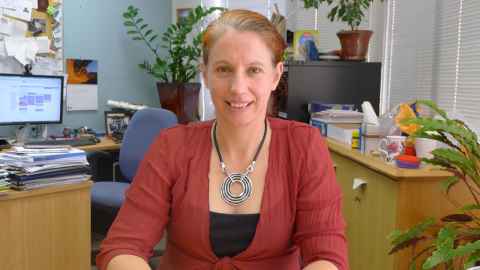Q & A with Professor Rosalind Archer
16 April 2019
Professor Rosalind Archer was this month named the vice president of Engineering New Zealand. We talk to her about what attracted her to engineering, and what it has to do with dancing.

What made you want to become an engineer?
I was good at maths at school, and wanted to apply maths to real problems, create solutions, and make a difference in the world. Also, I’m from New Plymouth, and in the 1980s we had the Think Big projects happening on our doorstep. They used to close the city streets at night for large items to be transported from the port, through the city, to their destinations – so as kids it was like a parade going on, and you’d go and see this mysterious stuff happening.
You were the first female Head of Department in the Faculty of Engineering, you’re Director of the Geothermal Institute and now you’re vice president of Engineering New Zealand. Is it still important to have women in such roles?
I think it is, especially for young women who, like in any profession, need to know that women can get the top roles. Engineering has what is known as a leaky pipeline – that’s a very engineering analogy – where women enter engineering but don’t always stay. Statistics show that almost 30 percent of women architects and engineers leave the profession in the first five years.
Also only 3 percent of Engineering New Zealand Fellows are women. That is one of the highest levels of professional achievement in the profession. Yet 26 percent of our current undergraduate student intake are women – and those women achieve well during their time in the Bachelor of Engineering.
It’s 2019. What is the problem with engineering and women?
It is a complicated problem. It is partly lack of role models, but also about the need for flexibility as your career progresses. Research also implies unconscious bias is likely to be factor. Some professional engineering roles can require long hours, or travel to remote locations – potentially making juggling home life difficult. However I think we are seeing changes that will make the workplace more flexible. For example I was heartened to see a major firm recently introduce “term-time” contracts where staff in some roles can be guaranteed leave for all 12 weeks of the school holidays, and be paid a pro-rata salary throughout the year.
Engineering NZ is very active in this space with its Diversity Agenda initiative. It’s doing a lot of work on flexible work practices, on unconscious bias, and on raising the image of engineering in general. People need to understand that if someone is an engineer that doesn’t mean they’ll be able to fix your car on the weekend! It has been overwhelmed by support. It was hoping to sign on 50 organisations as founding partners of the Initiative, but already has over 90 on board (including the Faculty of Engineering). It seems like organisations are saying, ‘I don’t want to be left out of this conversation’.
You are a dancer – and have talked about the relationship between creative arts and engineering on a TEDx talk.
I danced for almost all of my childhood, from six to 16, and started dancing again as an adult, performing with a local contemporary dance group, and until recently I taught dancing to children. I don’t see the world of engineering and the creative world as completely distinct. I see aspects of dance as applied physics – exploring force, energy, momentum, time and gravity. Engineering is truly creative. People might assume it involves reproducing solutions to problems that have been solved many times before, but look at the unique Te Rewa Rewa Bridge in New Plymouth. The structure is reminiscent of both a breaking wave and whale skeleton, and blends engineering, architecture and art.
What have been the most satisfying projects you’re worked on?
For me it comes back to the people rather than the projects. I lead the Master of Energy programme, which is an inter-disciplinary programme addressing energy from science, engineering and business perspectives. Around 200 students have graduated from the programme in the last seven years, and they come from all over the world. When I look at that as a collective of 200 professionals who are making a difference in their organisations – it’s a very satisfying contribution to advancing renewable energy deployment around the world.
Media queries
Margo White | Media adviser
DDI 09 923 5504
Mob 021 926 408
Email margo.white@auckland.ac.nz